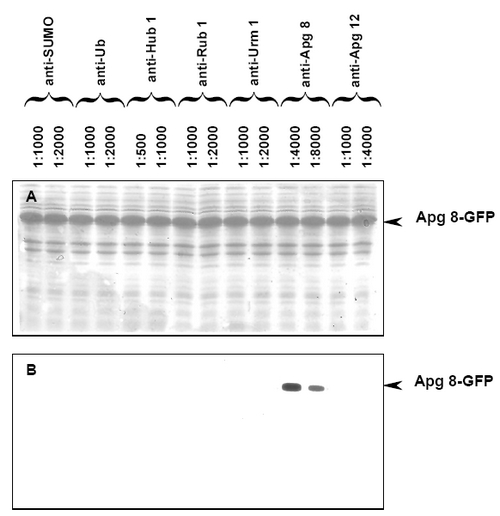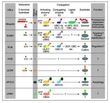ATG8 Rabbit Polyclonal Antibody
Other products for "ATG8"
Specifications
| Product Data | |
| Applications | ELISA, WB |
| Recommended Dilution | This purified polyclonal antibody reacts with yeast APG8 by Western blot and ELISA. Although not tested, this antibody is likely functional in Immunohistochemistry and immunoprecipitation. This antibody using the specified conditions may recognize other prominent intrinsic bands (UBLs or their conjugates). Other intrinsic bands are readily detectable in yeast lysates at lower antibody dilutions. Recommended Dilutions: For Immunoblotting a 1:4,000 to 1:8,000 dilution is recommended. A 14 kDa band corresponding to yeast APG8 is detected. Most yeast cell lysates can be used as a positive control without induction or stimulation. For ELISA a 1:20,000 to 1:100,000 dilution is recommended. For ELISA a working dilution of 1:20,000 to 1:100,000 is recommended. |
| Reactivities | Yeast |
| Host | Rabbit |
| Clonality | Polyclonal |
| Immunogen | This purified antibody was prepared from rabbit serum after repeated immunizations with recombinant yeast APG8 protein. |
| Specificity | This product is an IgG fraction antibody purified from monospecific antiserum by a multi-step process which includes delipidation, salt fractionation and ion exchange chromatography followed by extensive dialysis against the buffer stated above. Assay by immunoelectrophoresis resulted in a single precipitin arc against anti-Rabbit Serum. |
| Formulation | 0.02 M Potassium Phosphate, 0.15 M Sodium Chloride, pH 7.2 with 0.01% (w/v) Sodium Azide as preservative State: Purified State: Lyophilized purified Ig fraction |
| Reconstitution Method | Restore with 0.1 ml of deionized water (or equivalent). |
| Concentration | lot specific |
| Purification | Multi-step process |
| Conjugation | Unconjugated |
| Storage | Store vial at 2-8°C prior to restoration. For extended storage add glycerol to 50% and then aliquot contents and freeze at -20°C or below. Centrifuge product if not completely clear after standing at room temperature. This antibody is stable for one month at 2-8°C as an undiluted liquid. Dilute only prior to immediate use. Avoid repeated freezing and thawing. |
| Stability | Shelf life: One year from despatch. |
| Database Link | |
| Background | Ubiquitin-like proteins fall into two classes: the first class, ubiquitin-like modifiers (UBLs) function as modifiers in a manner analogous to that of ubiquitin. Examples of UBLs are SUMO, Rub1 (also called Nedd8), Apg8 and Apg12. Proteins of the second class include parkin, RAD23 and DSK2, are designated ubiquitin-domain proteins (UDPs). These proteins contain domains that are related to ubiquitin but are otherwise unrelated to each other. In contrast to UBLs, UDPs are not conjugated to other proteins. Apg8 is required for autophagy (intracellular bulk protein degradation) in yeast. Starved yeast cells take up their own cytoplasm into vacuoles through autophagic bodies. Autophagic bodies form a double-membraned structure called the autophagosome, which subsequently fuses with the vacuole/lysosome. This process similar in mammals. Two sets of genes, APG and AUT, have been identified with this process, and are responsible for two ubiquitin-like systems Apg12 and Apg8, respectively. Apg12 is synthesized in its mature form and seems to have one target, Apg5. Almost all Apg12 molecules are conjugated with Apg5. Aut2/Apg4 processes the Apg8/Aut7 system at its carboxy-terminal region. Apg8 exists in two forms, one is membrane bound through a phospholipid. Lipidation/ activation of Apg8 is mediated by Apg7 and transferred to Apg3 and finally forms a conjugate with phosphatidyl-ethanolamine (PE). Apg4 cleaves Apg8-PE, releasing Apg8 from membrane. Morphological studies show that Apg8 localizes on the membrane of intermediate structures of the autophagosome; this transient association seems to be essential for formation of the autophagosome. Both Apg12 and Apg8 are highly conserved, with apparent homologues in the worm, mammals and plants. In higher eukaryotes, Apg8 consists of a multigene family. |
| Synonyms | AUT7, CVT5, Autophagy-related protein 8 |
| Reference Data | |
Documents
| Product Manuals |
| FAQs |
| SDS |
{0} Product Review(s)
0 Product Review(s)
Submit review
Be the first one to submit a review
Product Citations
*Delivery time may vary from web posted schedule. Occasional delays may occur due to unforeseen
complexities in the preparation of your product. International customers may expect an additional 1-2 weeks
in shipping.






























































































































































































































































 Germany
Germany
 Japan
Japan
 United Kingdom
United Kingdom
 China
China




